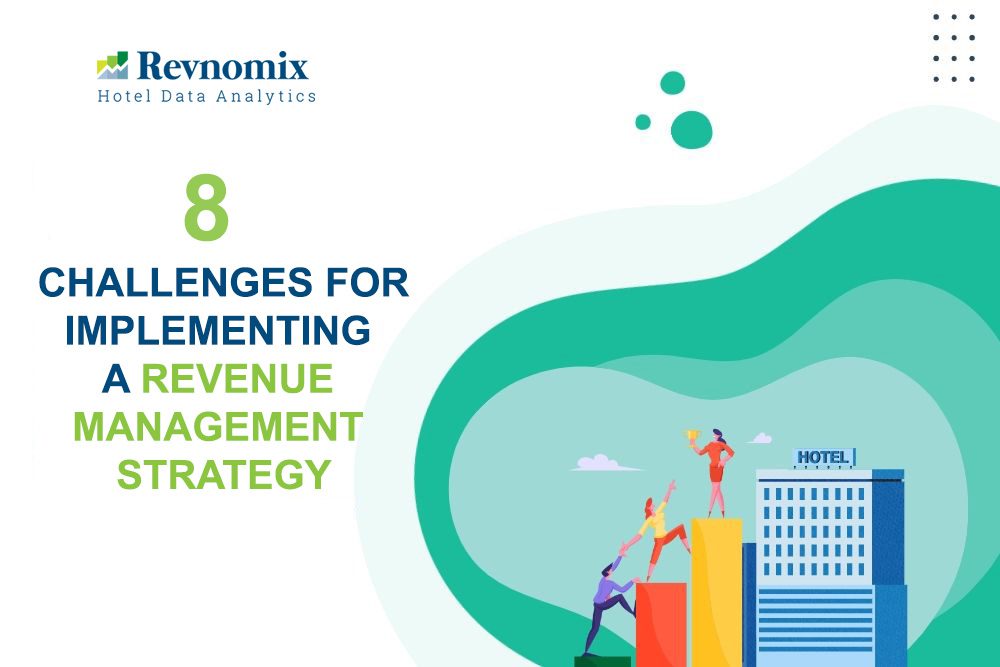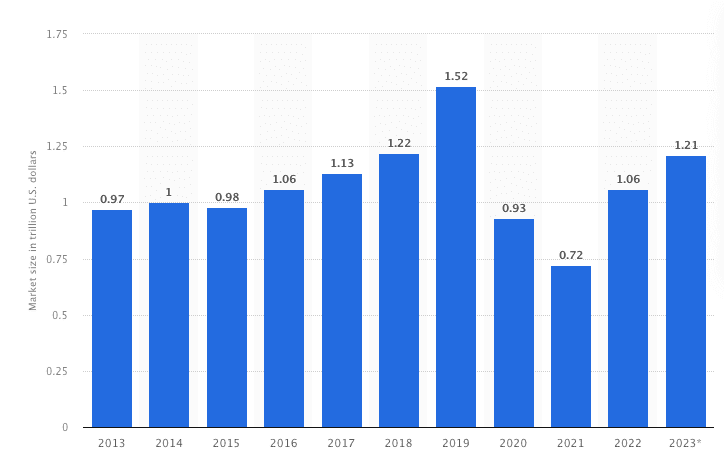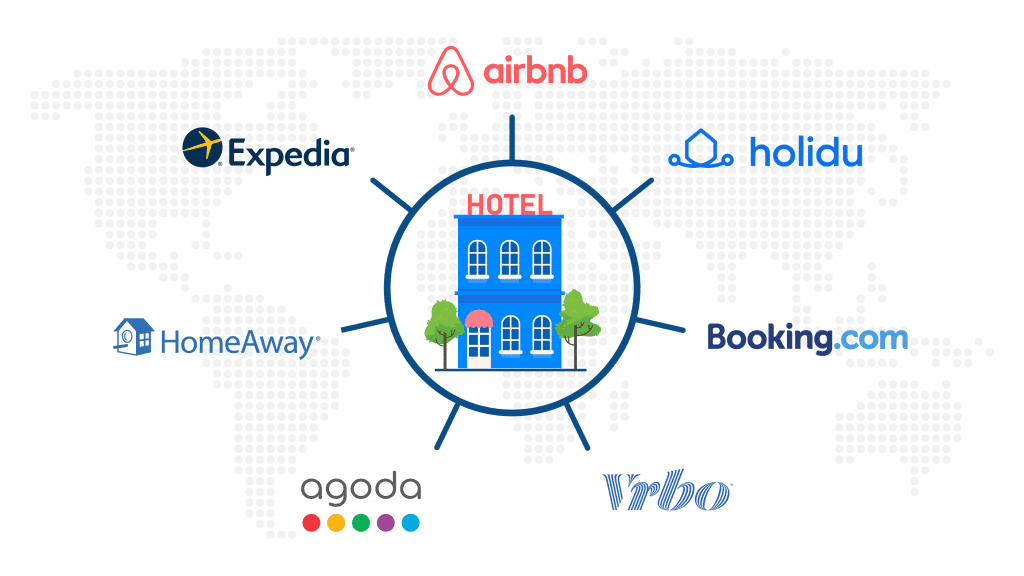Tag Archives: hotel revenue manager for hire

What is the hotel revenue management definition? Why is a revenue management strategy important? What kind of problems arise when implementing a revenue management strategy? A unique set of problems arise when implementing a revenue management strategy. Hotels must keep in mind the reasons behind channel optimisation and how direct bookings result in lower costs and a higher lifetime value for each visitor. We will discuss challenges hotels have while trying to put effective revenue plans into practice in this article.
The two main sources of difficulty are:
1. The hotel (internal)
2. The external market environment (external)
Looking for the top revenue management companies for hotels? Click below.
Explore the Best Revenue Management Company in India

Market size of the hotel and resort industry worldwide from 2013 to 2022, with a forecast for 2023.
Image credit – Statista
Key Hospitality Statistics
1. By the end of 2031, the global hotel and resort industry market is estimated to grow at a CAGR of 8.1% and reach US$ 1.27 trillion.
2. Room demand is likely to reach an all-time high in 2023 and continue to shoot up in 2024.
3. Online sales in the hotel segment will generate 80% of total revenue by 2026.
4. In 2023, 42% of travelers want to go on a break that focuses on their mental and physical health.
What are the Key Challenges When Implementing a Revenue Management Strategy?
What is the goal of revenue management? We have discussed it in the previous articles. Implementing a revenue management strategy is critical for hotels aiming to maximize profits by optimizing revenue management pricing, inventory, and demand. Here are a few key challenges that hotels face. Looking for the best revenue management system? Click below.
Request a Demo for the Top Hotel Revenue Management Software
Internal Challenges
1. Growing one’s skill set
Revenue management is crucial! There is certain knowledge and abilities needed for the revenue management position. It will be hard to develop and carry out a good strategy if you lack that wide-ranging skill set.
The first difficulty for a revenue manager is to acquire the proper abilities. You might already be an expert in the industry and have more than 10 years of expertise. Or perhaps you just switched from another team and are still learning. Given that you have dealt with less activity during the past 14 months, you might need to brush up on your skills.
In either case, training, skill-upgrading, and knowledge refresh will give you the essentials you require and keep you current on the most recent best practices. This could be taking evening classes, getting mentoring from a more seasoned revenue manager, or just doing research. It’s more crucial than ever to spend money on the training required for expert revenue management techniques. A robust knowledge base and skill set are the cornerstones of any successful revenue plan. Finding a hotel revenue manager for hire? Why? You can hire your whole team.
Talk with Your Team for the Best Revenue Management Solutions

Different online channels.
Image credit – https://www.springboard.com/
2. A lack of tech that can handle several web channels
For many revenue managers today, those who work with small or standalone properties, tech – or lack thereof – is a typical hurdle. In the rush to keep up, many small hotels, even those with skilled revenue managers are faced with major and expensive tech obstacles.
The problems might range from having several tech systems that might not work well together to not having the resources available to invest in the tech your hotel needs. Without the correct tech, revenue managers may be forced to spend hours each day staring at spreadsheets in order to maintain their web channels. Without the proper tools, the task could become overly manual.
A tech investment is unavoidable if an intricate revenue management strategy is to be executed across many online channels. Finding the correct tech can be challenging, and you don’t need any more obstacles standing between you and potential clients right now. Make the best possible case for finding and investing in the ideal tech for your hotel.
Outline the amount of time spent each day on manual chores and provide examples of other types of work that could be completed if the manual tasks weren’t taking up so much time. Include work on price and inventory by channel, in-depth forecasting, and marketing segment analysis.

Effective communication and coordination between the departments.
Image credit – https://miro.medium.com/
3. Seamless communication between teams
Revenue management in the hospitality industry relies on communication. When you’re trying to implement revenue management strategies, communication can be a significant obstacle. If you haven’t listed your goals and problems as a team, general managers or members of your sales and marketing team may have other goals that don’t coincide with yours in terms of revenue. Reach out to one another to remove any obstacles to open dialogue and provide your hotel the chance to streamline its goals.
What position do you hold within the corporate and communication systems of your hotel, as the revenue manager? This comes down to how well you’ve established your plan and how well your team members across the hotel work together.

Different OTA channels.
Image credit – https://hisitecm.com.au/
4. Calculating the distribution cost
Costs of distribution must be accurately calculated. However, it is easier said than done. It might be challenging to find actual prices when using a mix of standard channels (GDS, phone) and online channels (brand websites, OTAs, Google Hotel Ads). How would you know a customer’s precise route? For instance, if they view your online ads and visit your website before calling to make a booking? How can the expense be accurately assigned?
These ‘invisible’ avenues to purchase may cloud your perception of the true value of your online and offline actions. Direct bookings may be more expensive than in the past due to the increasing value of online paid ads (Google search ads, social media trends this week, ads, etc.), but these same paid initiatives also help to build brand awareness. Did you realise that Google no longer charges for hotel booking links?
Even when OTAs are bidding on your hotel’s brand name, which they do if you’re on an OTA – and sometimes even if you’re not – they are, running ads that puts your direct channel at the top of results. Running these marketing campaigns benefits offline bookings as well as your overall brand image.
Pay attention to the channel costs as a revenue manager. Consult with your sales and marketing team to learn more about the campaigns that prompted customers to make bookings on specific avenues. To figure out how users arrive at each channel, they need to examine attribution models. This can help you determine which channels are costing you the most and show you whether you can afford to move your bookings to a cheaper channel. Click below to know about our major clients and the best revenue management software for hotels.
Learn More About our Clients & Top Revenue Management Systems
External Challenges
We have also learned about the revenue management history in the previous articles. These are a few of the internal, personal struggles you’ll experience. What about external factors? Here are a few factors that will influence your revenue plan.
1. OTAs are the kings of online sales
The revenue management function includes OTAs. OTAs now control 40% of the whole global travel market. Distribution costs have risen twice as fast as room revenue, and OTA booking shares are rising as well. New channels are emerging, forcing hotels to broaden their selection of channels to include things like TripAdvisor and Google Hotel Ads.
Don’t undervalue the impact that OTAs and metasearch sites have on your distribution strategy, organic strategy, and paid marketing strategy. Here is more data on metasearch. It’s challenging for your website to stand out in the cluttered distribution landscape and the severe competition inside domestic markets. Luckily, effective marketing can help you get through this; strong places to start are brand campaigns and email marketing.
A smart distribution plan for small hotel chains can assist in focusing your efforts on the channels that will yield the most returns for you. Small hotels lack OTA’s or a Hilton’s financial resources! You’ll have an advantage if your strategy is unique and flexible.
2. Pricing strategies and factors
The revenue management process includes pricing.
Factors
Both macro and micro issues are included in the pricing variables. A prime example of a macro issue is the lack of clarity the epidemic has brought about for the travel and tourist sector. Over the years to come, it’s likely that hotels will have to take the pandemic’s effects on the economy and society into account when setting costs.
Micro problems could include prices being altered by outside parties as a result of regional variations, discounts, or mistakes. While there are tools to assist, keeping up with those to maintain parity with the direct route is a time-consuming job.
In the end, keeping rate parity is a challenging and time-consuming task that, in certain cases, may not be the best to take on. If you’re not legally compelled to keep rates the same across all of your internet outlets, think about adopting a pricing approach that gives you some clever flexibility. You might decide to give a 5–10% discount on a few channels, for instance. Even though you still need to keep an eye out for mistakes and inaccurate prices, this could be more challenging but also more profitable.
Strategies
What internal pricing policy does your hotel employ? For any pricing strategy, you must select a data-driven pricing method. You have the option of using either a BAR strategy or open pricing when it comes to strategy. Open pricing is a great investment if you have the time and resources to make it happen.
Instead of shutting down channels or imposing length-of-stay restrictions on discounted channels when demand is great, open pricing is the concept of changing prices on various channels in response to demand. The door is always open with open pricing, but at prices that are in line with channel demand.
Contact Us for the Best Revenue Management Services
3. What hotels claim to want to do versus what occurs
Revenue management benefits are immense. But when hotels assert that they want more direct bookings, do they make enough investments in the necessary tech to make this happen? What is the problem? One in four small hotels listed complexity as their main hurdle to implementing tech, while one in three said ease of use was a top priority when looking at options.
Staff training is another crucial area to engage in. It goes hand in hand with making the proper tech investments. Your book direct plan isn’t going to be successful without a team of experienced, skilled revenue managers, marketers, and the tech to manage many channels.
All hotels in the sector must coordinate their goals with their actions. This may include increasing the funding allocated to these sectors or reviewing their current spending and strategy.
4. Flexibility in terms of pricing and approach
Revenue management tools are required for flexibility. Hotels in branded chains are subject to very specific methods, norms, and costs. Small hotels have more freedom to experiment and come up with new ideas because of their higher flexibility.
A standalone hotel can differ in its amenities and setting. They can respond to customer requests, providing customised service that increases the hotel’s loyalty from its clients. Independent hotels are able to experiment with their brand. It might be freeing to not adhere to a particular brand standard. Marketing teams are able to experiment with various channels fast and to adjust their strategies as needed.
Independent hotels also have a large margin of error. Fewer parties are competing for the same share of the pie. As you face challenges, seize the chance to be proactive and adaptable. Your revenue management strategy should be sound, but you should be allowed to adjust budgets and strategies as required.
Discover Business Intelligence & Revenue Management Solutions for Hotels
How do you Handle these Challenges When Implementing a Revenue Management Strategy?
Any hotel that wants to expand and succeed in a fast-paced, cut-throat market needs to have a strong revenue management strategy. You may detect and manage potential risks and issues as well as measure, forecast, and optimise your revenue streams with its help. So what can you do? Here’s how to handle these challenges.
Discover Business Intelligence & Revenue Management Solutions for Hotels
1. Know your revenue sources
Did you know? Knowing what drives your hotel is the first step to managing revenue risks and problems. You must examine how your revenue performance is impacted by your revenue sources, segments, channels, products, customers, and rivals. You must keep an eye on your most crucial revenue data like sales volume, average revenue per user, and customer lifetime value as well.
2. Create backup strategies
What’s the next step? The second step in managing risks and problems related to revenue is to make plans for various outcomes. You must plan ahead for a variety of factors that could affect your revenue. Such as shifts in client demand, market conditions, rival activity, legal or regulatory difficulties, or internal causes. Assess the possible outcomes and effects of many scenarios and propose other courses of action.
3. Execute strategies for revenue optimisation
Are you ready to grow? Applying revenue optimisation methods is the third phase in managing revenue risks and problems. To increase customer loyalty, improve pricing, expand into new markets, add new goods or services, you must make the most of what you learn from your revenue management strategy. Searching for the best revenue management software? Read some of our previous articles as well.
[Suggested Read: Top 9 Revenue Management Strategies for Gen Z in Hospitality]
4. Keep track of your revenue results
Tracking and evaluating your revenue performance is the fourth phase in managing difficulties and risks related to revenue. You must monitor and analyze your revenue data using dashboards, reports, or analytics systems. In order to gauge your success, uncover patterns, pinpoint problems, and find options.
How to evaluate if your hotel is doing well? In order to evaluate, spot gaps, and implement measures, you must also compare your actual outcomes with your planned outcomes using tools like benchmarks, or KPIs.
5. Learn to adjust to changing events
Do you know learning and adapting to shifting situations is the fifth phase in managing revenue difficulties and risks? You must keep learning from the results, comments, and experiences of your revenue management strategy in order to enhance your revenue processes, systems, and abilities.
6. Talk with stakeholders
What’s more? In order to manage revenue risks and challenges, the sixth and final phase is to talk with stakeholders. To inform, persuade your stakeholders, you must convey your revenue management strategy results, insights, and ideas using tools like visuals, tales, or slideshows. In order to win their support, trust, and dedication, you must also work in sync with them.
[Suggested Read: 7 Ways Your Hotels Are Missing out on Revenue Opportunities]
Can Revnomix Solutions Help with a Successful Revenue Management Strategy?
Revnomix Solutions is your trusted partner for the best revenue management services and revenue management software. When most hotel’s revenue management is optimized only at 40%, we ensure your hotel is not one of them. We use our expertise, the latest tech and 24/7 customer service to make data analytics and Revenue management seamless for clients. Our clients include major hotel brands like Hilton, Ramada, the Leela and more. Looking for the best revenue management company or revenue management strategy? Want to boost your hotel’s topline revenue by upto 20%? Want to increase hotel revenue? What’s stopping you? Contact us today!